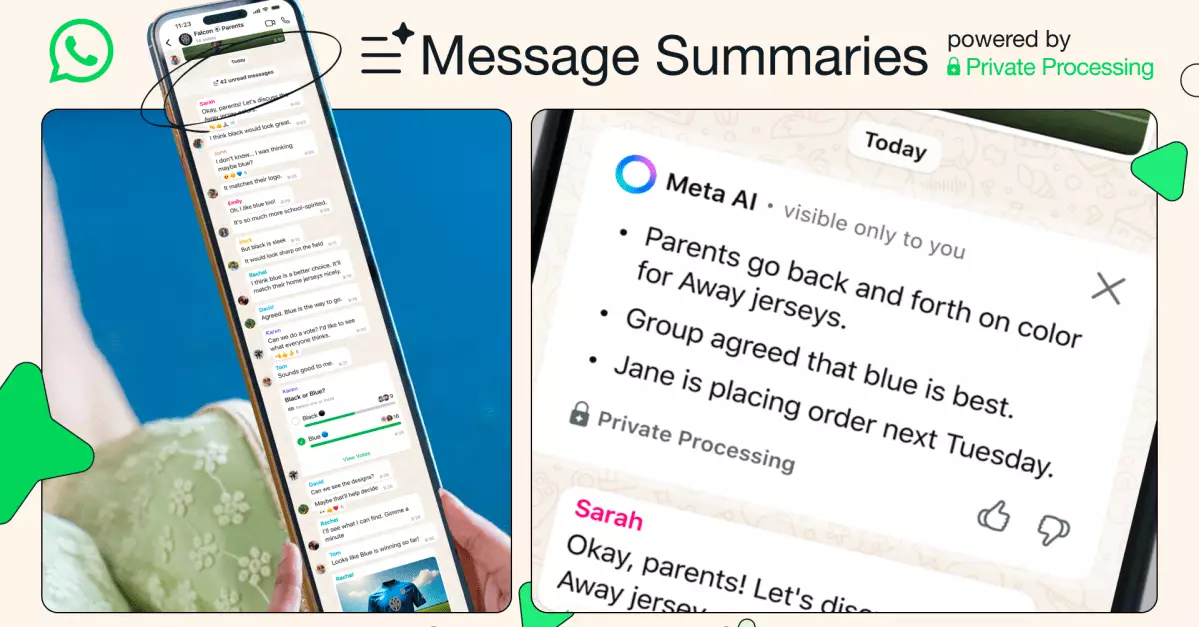In a groundbreaking move, WhatsApp has integrated Meta’s AI technology to help users manage their conversations more efficiently. As our digital communication grows increasingly overwhelming, this innovation aims to alleviate the burden of catching up on unread messages. Imagine opening your chat only to be met with a succinct, organized summary of what you’ve missed. That’s the promise of Meta’s AI-generated message summaries, which presents a bold attempt to redefine how we interact with our messaging apps.
Functionality Meets Privacy Concerns
The rollout of this feature has been strategically limited to English-speaking users in the U.S. for now, yet the implications of this service extend far beyond simply summarizing messages. Utilizing Meta’s Private Processing technology, the summaries are designed to preserve user privacy by ensuring that neither Meta nor third parties can access the specifics of your conversations. While at face value, this appears to be a significant step toward safeguarding user data, it also raises questions about how effective this “secure cloud environment” truly is. In an age where data breaches and privacy scandals are rampant, skepticism is justified.
Importantly, the AI-generated summaries are an optional feature, which addresses some user concerns, especially regarding the rising tide of AI integration in daily life. WhatsApp has taken steps to ensure users can control their privacy, allowing them to disable AI features in group chats through the “Advanced Privacy” settings. This reflects an awareness of user apprehension toward uninvited AI interventions.
User Experience: Blessing or Burden?
Despite the promising functionality of AI message summaries, user feedback has not been entirely positive. Some individuals feel inundated by the new Meta AI button located at the bottom-right corner of the app. This addition has stirred frustration among users who favor a more minimalist interface. It raises the important point: How much is too much when it comes to incorporating AI into everyday applications?
Additionally, it remains to be seen whether the AI technology will maintain the accuracy expected by users. Drawing parallels with the initial launch of Apple’s AI-generated message summaries, there are legitimate concerns regarding how well the algorithm can grasp the nuances of conversations. An inaccurate summary could lead to misunderstandings, thus defeating the purpose of the very feature intended to simplify communication.
Balancing Innovation with User Trust
Meta’s continuous push to embed AI features into WhatsApp represents a broader trend in the tech industry—an eagerness to innovate that must be tempered with a respect for user trust. Features providing utilities like image generation and responsive chat queries are impressive, yet there must be a balance between enhancing user experience and ensuring that privacy standards are upheld. As we stand on the threshold of this new era in messaging, the conversation surrounding user empowerment and agency in AI applications remains both relevant and necessary.
While WhatsApp’s AI message summaries can potentially enhance communication, the overarching themes of user control, privacy, and accuracy will determine its success. This evolution in messaging apps encapsulates a complex interplay between modern technology and the human desire for connection—and it will be fascinating to observe how this narrative unfolds.

